REVEALED: The lost letters that could have swung an election
An inquiry into groundbreaking electoral reform and an “enduring, bipartisan commitment” to an independent Speaker were presented by Steven Marshall as commitments for a Liberal Government in 2014 negotiations with a key independent, newly discovered documents reveal.
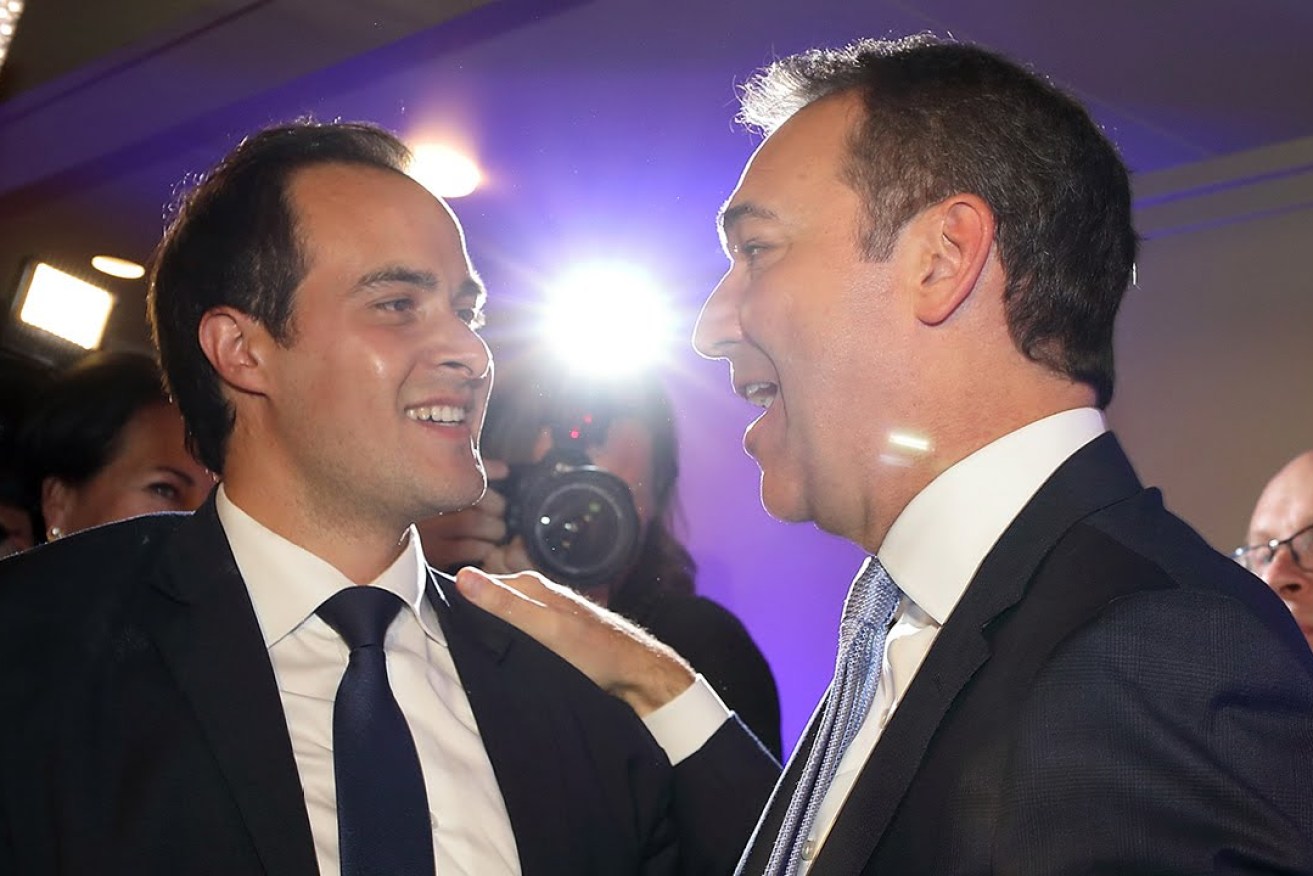
Steven Marshall greets Vincent Tarzia on election night. Photo: Tony Lewis / InDaily
The then-Opposition leader also pledged his party’s “commitment” to establishing a new “Investigator-style” science centre and a social history museum in the Adelaide CBD, as well as exploring bringing interstate train passengers back to the Adelaide Railway Station.
The commitments were detailed in correspondence sent to the late Bob Such after an initial meeting with the former Fisher MP, a one-time Liberal government minister turned independent.
Such later withdrew from all negotiations after being diagnosed with a brain tumour. He died in October 2014.
His absence was the catalyst for fellow independent Geoff Brock to support Jay Weatherill’s Labor government, citing the need for stability.
Documents discovered recently by Such’s widow Lyn, seen by InDaily, shed light on negotiations with the Liberal Party in the days after the state election.
Lyn Such says she thought the correspondence had been thrown away, but discovered it recently when sorting through papers.
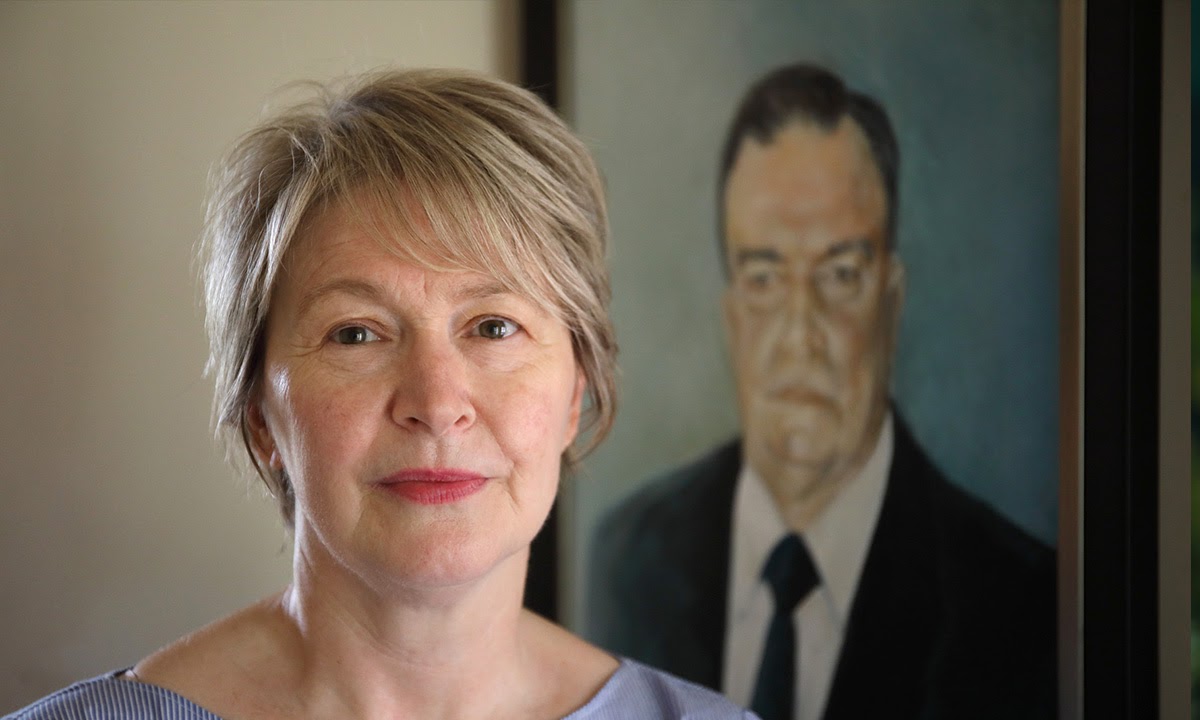
Lyn Such in front of a portrait of her late husband Bob. Photo: Tony Lewis / InDaily
In one letter, Marshall seems to imply that Such will be offered the speakership – a position he previously held after the 2005 resignation of Peter Lewis until the March 2006 state election.
In the letter, dated 19 March 2014 – four days after the election – Marshall says he “looks forward to our further discussions in seeking your support of a Liberal Government for the next 4 years” and points to an attached documents that “outlines a proposal for the role of Speaker of the House of Assembly”.
“I am interested to discuss this role with you further,” he writes.
“I particularly appreciated our discussions centred on the role of government, freedom of the individual, and giving decision-making to communities from centralised bureaucracies.
“I believe we share the same fundamental philosophy of government, and equally the same appreciation of the challenges that SA currently faces.”
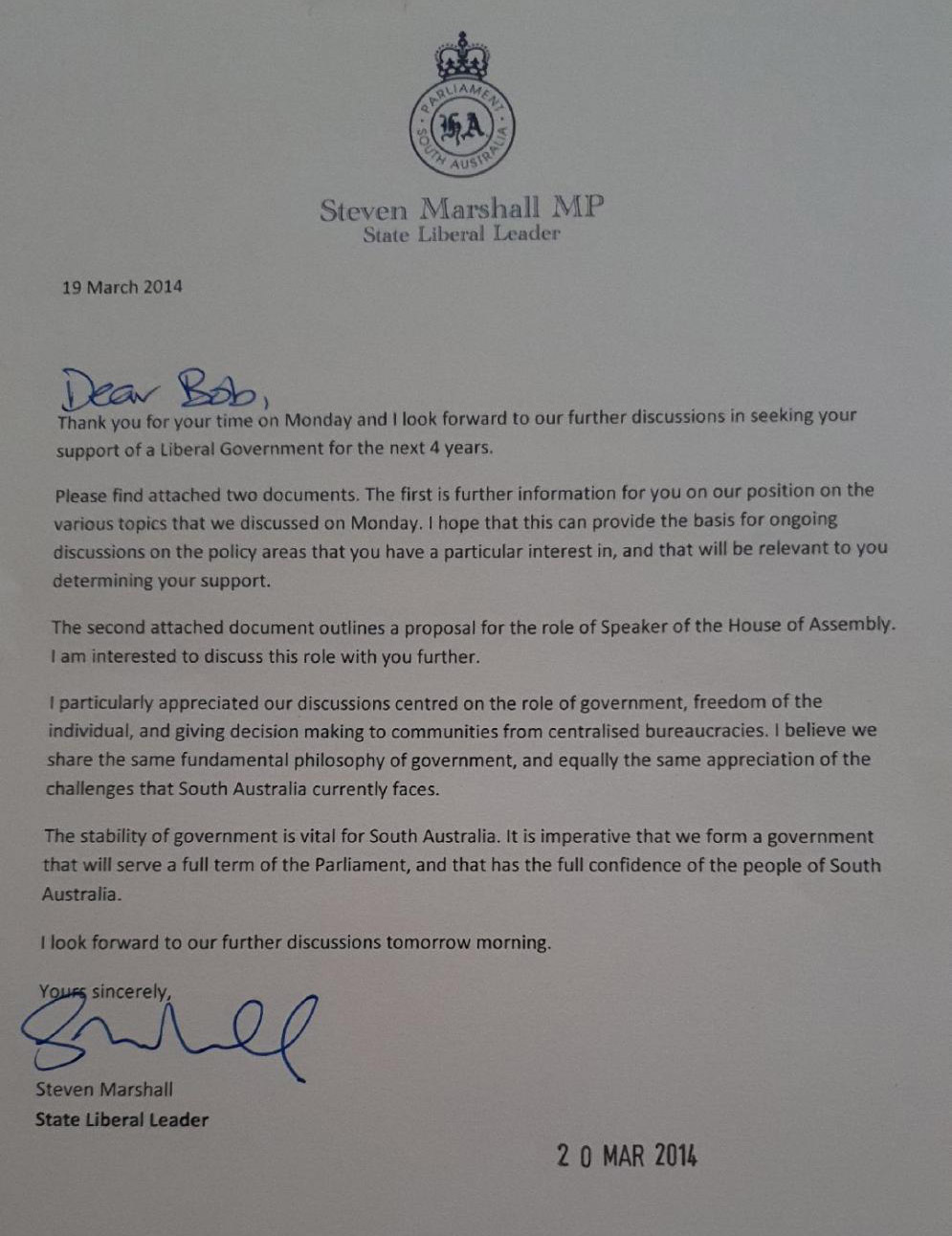
The letter from Marshall to Such.
An attached memorandum, dated March 18, spells out the “proposed role of an independent speaker”.
“In the Westminster system, an independent Speaker strengthens the independence of the Parliament from the Executive,” the document states.
“The House of Assembly has had independent speakers in the past but independence has not been sustained. While the composition of the 53rd parliament [a hung parliament with Such and Brock holding the balance of power] makes an independent speaker more likely, a Marshall Liberal Government would want to work with an independent speaker to lay the foundation for an enduring, bipartisan commitment to independence.”
The memorandum proposed that “the House should require their Speaker to put their duties as Speaker above their partisan associations”.
“Where the Speaker is a member of a political party, Government or Opposition, they should withdraw from all parliamentary meetings of that party,” it stated.
This notion does not appear to have been carried out after the Liberals formed Government in March this year, when backbencher Vincent Tarzia was appointed Speaker, with his aim “always to remain firm but fair”
Tarzia told InDaily he does not attend question time strategy meetings but does attend joint party-room meetings “as they provide information about the Government’s initiatives which enables me to respond to my constituents”.
“There’s no stated policy on this,” he said.
“Over time some Speakers have attended [joint party-room meetings] and others have not.”
He said the Premier had not indicated a preference either way.
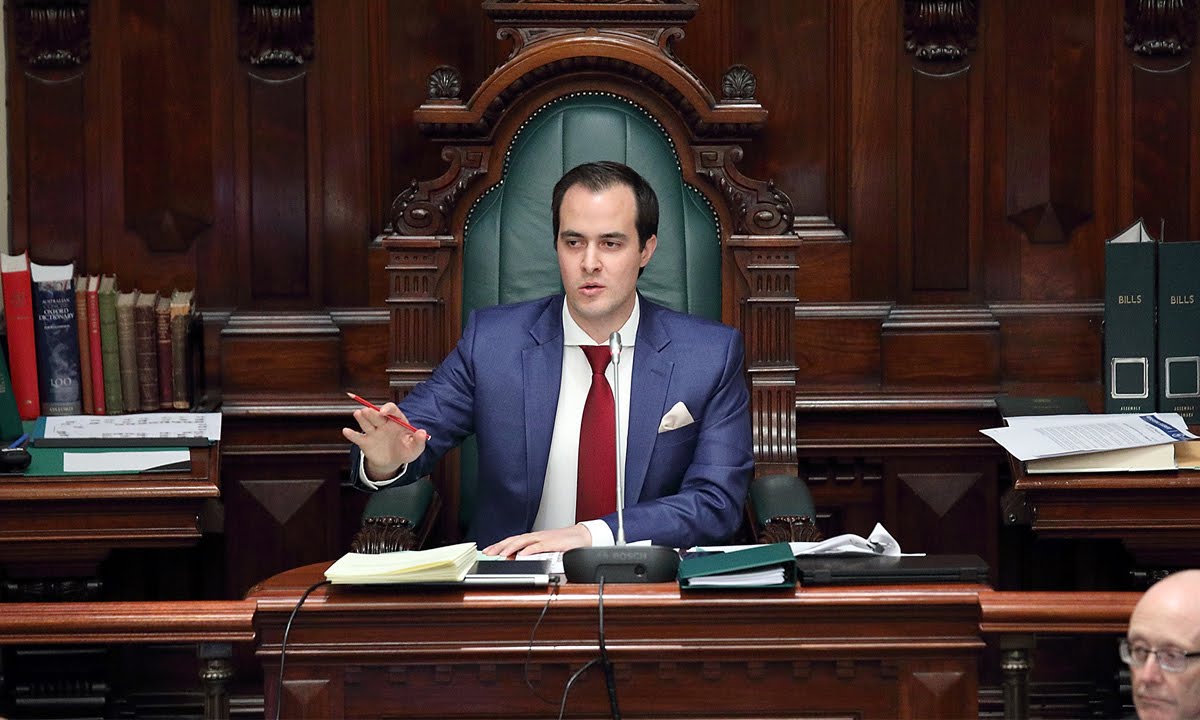
Liberal Vincent Tarzia was appointed as Speaker after the election. Photo: Tony Lewis / InDaily
The 2014 memorandum outlined “strong” Liberal support for parliamentary reform, a process “ideally led by an Independent Speaker, working with the President of the Legislative Council and with the support of the Government”.
“We would seek to establish an Electoral and Parliamentary Reform Committee as a House of Assembly Committee, including Members from the Government and Opposition, chaired and led by the Speaker,” it said.
“In relation to Electoral Reform, the Committee would hear evidence from the Electoral Commission, academic experts and the broader community [and] make recommendations to the Parliament about potential further reforms of the electoral system.”
These “may include” radical reforms such as “optional preferential voting [and] lowering the voting age”.
Other reforms mooted included new procedures for replacing Casual Vacancies in the House of Assembly – which currently require a by-election – and pre-poll voting and counting.
The document also outlined “significant Parliamentary Reforms” for consideration, including “appropriate allowances for Shadow Ministers, Committees and other positions”, a revamp of Standing Orders “to enhance Private Members Time and the allocation of time and priority to Bills and Motions” and a review of sitting times, including Question Time – which Tarzia has also indicated is on his radar.
“The parliament of SA should be held in higher regard by the community than it is,” the memorandum concluded.
“It behoves us all to reform our institution to ensure that the Parliament lives up to its calling [and] an independent Speaker is well placed to lead this effort.”
Tarzia says he believes “the current method of voting works well, however if a Committee were to be set up I’m sure improvements may be suggested”.
“For example, electronic voting would surely be something to be considered in the future,” he said.
Marshall told InDaily that he had not specifically offered Such the speakership, but was disposed to doing so as discussions continued.
“I don’t think we got into a position where we offered anything to him [but] certainly he was in my mind as a very acceptable person to take on that role,” he said.
“I thought he would have made a good Speaker.”
Asked whether he was still disposed to the Speaker being an independent, Marshall said: “I think Vincent Tarzia is doing an excellent job… he’s displaying all the characteristics you want.”
The Premier said he was still open to pursuing electoral and parliamentary reform, possibly by establishing a parliamentary committee as outlined to Such, but it was not an immediate priority.
“I think from time to time, governments do need to look at whether current electoral and parliamentary practices are up to date,” he said.
“The previous government and I sat down with a view to some reform in terms of parliament, and especially in terms of the number of committees and the way they operated… unfortunately, that didn’t reach a conclusion.”
He said further reform was “something we’d look at in this term of parliament, for sure”.
“I think every parliament needs to look at its practices,” he said.
“I’m always interested in parliamentary and electoral reform – every parliament has the obligation to make sure its processes serve the people of SA.
“I think there’ll no doubt be recommendations from the electoral commission… we’re open to discussions but it’s not something that’s high on the agenda for the first six months.
“We’ll review the processes, sit down with other parties and other individuals and see if there’s any appetite for ongoing improvement.”
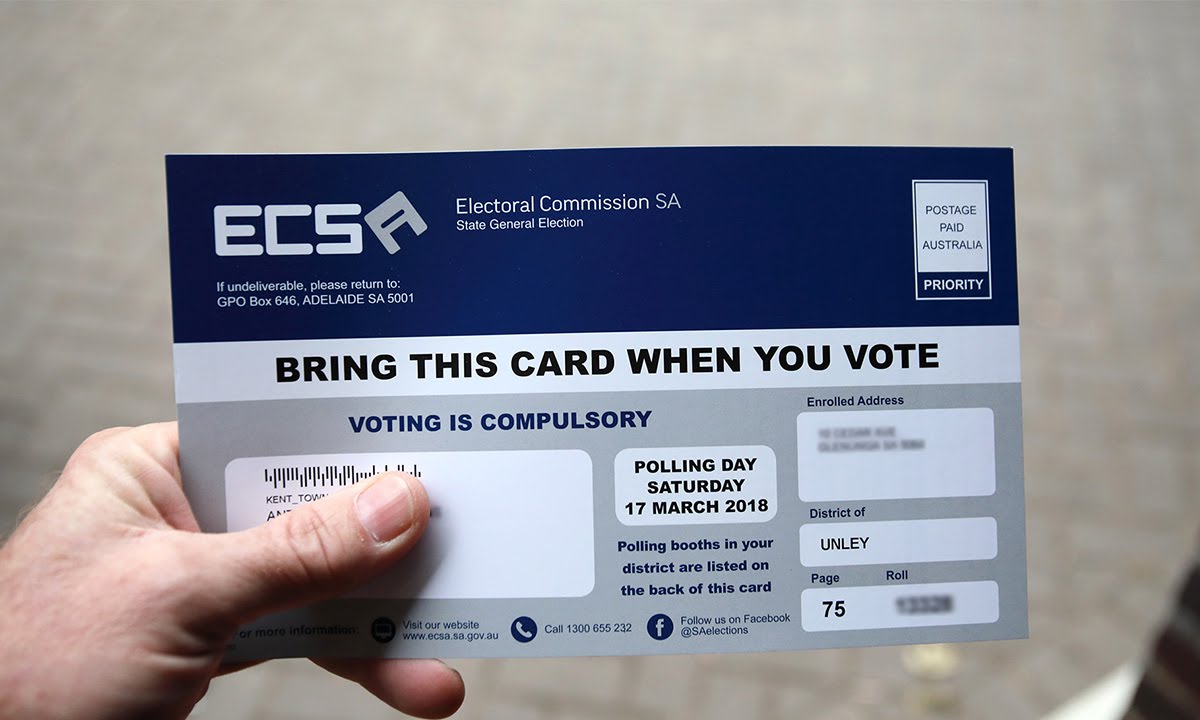
Marshall says he is still open to pursuing electoral reform. Photo: Tony Lewis / InDaily
Marshall’s correspondence with Such also detailed a range of policy commitments for him to consider – outlined in what appears to be an early draft of the party’s 2036 manifesto that was later publicly unveiled in 2016.
Marshall’s letter says the document provides “further information for you on our position on the various topics that we discussed” on the Monday after the election.
“I hope this can provide the basis for ongoing discussions on the policy areas that you have had a particular interest in, and that will be relevant to you determining your support,” the Liberal leader writes.
The document contains a chapter specific to Such’s Fisher electorate, which highlights the Liberals’ commitment to building a fourth lane for Flagstaff Road (which remained a policy commitment at the 2018 election) and a since-abandoned pledge to double State Black Spot funding “to make our roads safer and more efficient”.
The manifesto also commits to working with the federal government “to upgrade the entire north-south road corridor starting at Darlington”.
There were also more niche pledges, with the document claiming the Liberals are “committed to re-establishing an Investigator-style science centre in Adelaide” and “establishing a social history museum in the Adelaide CBD”.
It also commits to “improving the delivery of interstate and regional passengers into the Adelaide CBD, potentially to North Terrace (Adelaide Train Station)”.
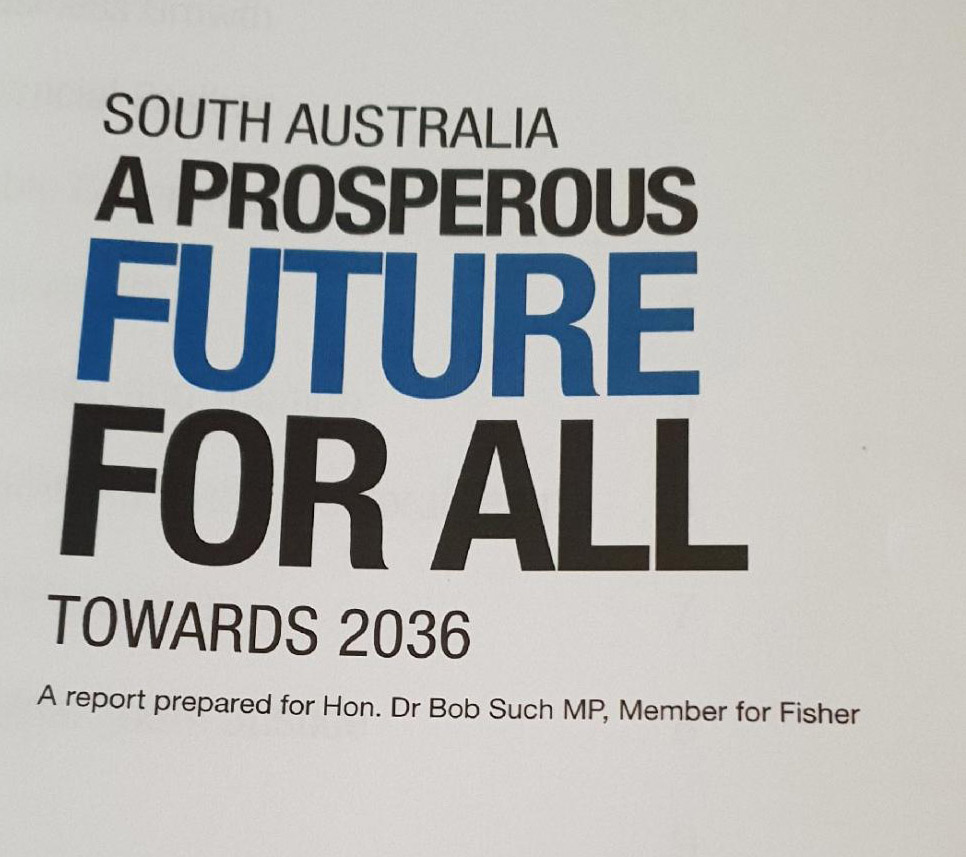
A photograph of the Liberal policy document sent to Such.
Marshall says now the policies were “all things we discussed in the first meeting we had”.
“They were all things that were important to him, but we hadn’t rolled any of them out at the time,” he said.
It was part of the negotiating process… we were open to continue negotiations [but] that process didn’t resume.”
As to whether the commitments would return to the Liberal agenda in Government, Marshall said “they’re not things I’d rule out… if the money was available”.
“They’re not things we committed to in the lead-up to the 2018 election,” he said.
“Our first budget was a particularly tight budget [but] they’re all things that have got a level of support in the community and as money becomes available they’re things we can consider.”
Lyn Such said the Liberals’ correspondence appears more detailed than anything her husband received from Labor, which she believes has been thrown out.
She said she believed Labor had raised issues about processes for contesting speeding infringement notices – a bugbear of the late MP after he spent more than $30,000 challenging a speeding fine.
However, she is adamant there was no formal offer of any position from Jay Weatherill, and that the Liberal Party was “much more formal and communicative than Labor”.
However, she believes “stability for SA” would have been Such’s main concern in deciding which party to back, and “that probably would have been Labor [but] we will never know because it was such early days”.
She maintains he would have needed several more days to weigh things up, including analysing where voters in Fisher put their second preferences.
The stability of government is vital for South Australia
On the Wednesday after the 2014 poll she and Bob retreated to Goolwa to get away from the media glare and allow him a chance to think. She took him to Flinders Medical Centre for tests the following Friday, and he was later diagnosed with the tumour.
Ironically, Marshall’s 2014 letter to Such concluded: “The stability of government is vital for SA.”
“It is imperative that we form a government that will serve a full term of the parliament, and that has the full confidence of the people of SA,” he wrote.




